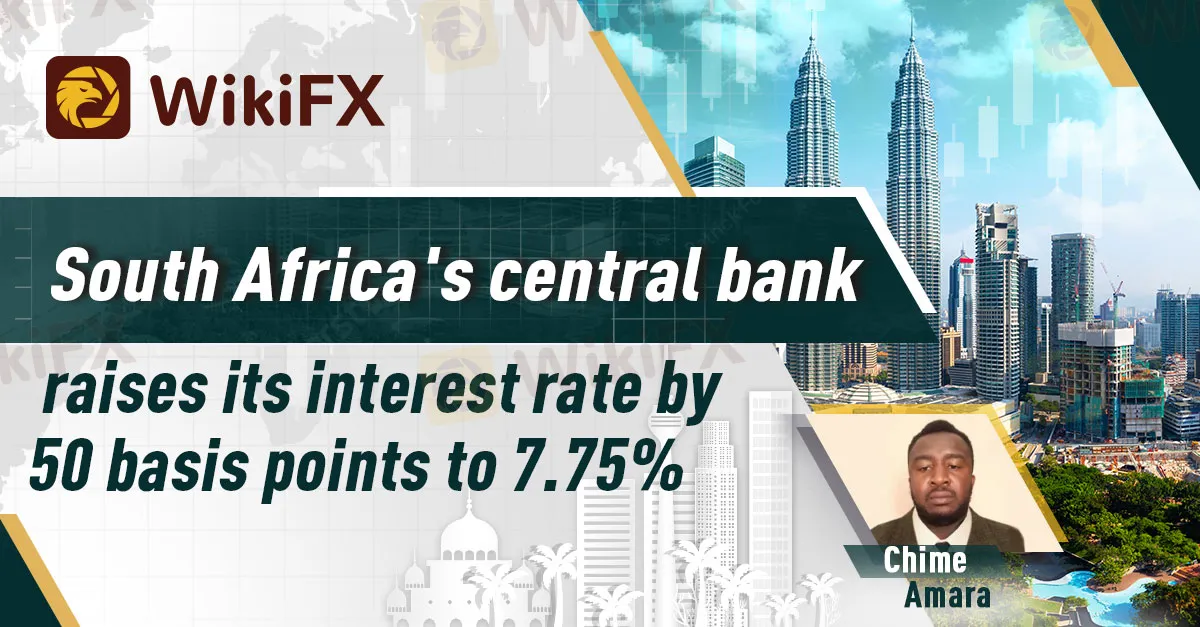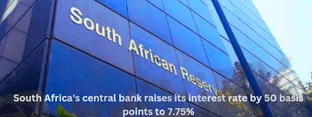简体中文
繁體中文
English
Pусский
日本語
ภาษาไทย
Tiếng Việt
Bahasa Indonesia
Español
हिन्दी
Filippiiniläinen
Français
Deutsch
Português
Türkçe
한국어
العربية
South Africa's central bank raises its interest rate by 50 basis points to 7.75%
Abstract:South Africa's central bank has raised its main lending rate by 50 basis points to 7.75% last week's Thursday in an effort to curb it's rising inflation rate.

By: Chime Amara

South Africa's central bank has raised its main lending rate by a surprising 50 basis points to 7.75% in an effort to curb it's rising inflation rate. The current hike came much higher than the market expectations of just 25 basis points.
This marks the ninth consecutive time the South African Reserve Bank has raised rates, adding a total of 425 bps to the repo rate since tightening policy in November 2021.
The move comes after February consumer inflation in South Africa rose to 7.0% year on year from 6.9% in January, indicating that nationwide power cuts may be driving price pressures. The central bank aims to keep inflation between 3% and 6%.
The Monetary Policy Committee was divided in its decision, with three members advocating for a 50 bps increase and two favoring a 25 bps increase. Central bank governor Lesetja Kganyago cited risks to the inflation outlook, stating that despite easing of producer price and food inflation, global price levels remain elevated, while electricity prices and other administered prices present short- and medium-term risks.
Kganyago also noted that the headline inflation rate in South Africa has been primarily driven by fuel, electricity, and food price inflation. He further revealed that he expects food and fuel inflation to ease gradually, up to 4.9% by 2024 and 4.5% in 2025.
Market analysts expressed surprise at the central bank's decision, with some noting that the higher outlook towards food and core goods inflation prompted the move. FNB Chief Economist, Mamello Matikinca-Ngwenya, said the road ahead is precarious, indicating uncertainty in the economic growth prospects. The rate hike has also triggered a surge in the rand, which rose nearly 2% against the dollar.
Overall, the central bank's decision to raise interest rates by 50 basis points is a sign of its determination to address rising inflation, even if it comes as a surprise to many market analysts. The impact of the rate hike on the South African economy remains to be seen, but the central bank's cautious approach suggests that it is closely monitoring the situation and taking steps to address any risks to economic stability.

Disclaimer:
The views in this article only represent the author's personal views, and do not constitute investment advice on this platform. This platform does not guarantee the accuracy, completeness and timeliness of the information in the article, and will not be liable for any loss caused by the use of or reliance on the information in the article.
Read more

Iran’s Strait Strategy: Is the World Ready for $100 Oil?
Tensions in the Middle East are rising quickly, and global oil markets are already feeling the pressure. Since Iran and Israel entered open conflict, oil prices have jumped from around $60 to nearly $80 per barrel. Now, with the United States joining the fight and launching strikes against Iran, the situation has become even more serious. Iran’s threat to seal off the Strait of Hormuz could ignite a global energy meltdown, spike oil prices beyond $100, and unleash economic chaos across the world.

OneRoyal: Regulated in Some Countries, Warned by Others
When choosing a broker in the online trading world, it’s important to check who regulates them and what kind of services they are allowed to offer. OneRoyal is a broker operating in different countries and holding several licences from recognised regulators. However, some details raise concerns that traders should not ignore.

FXTM: A Closer Look at Its Licences
Choosing a trustworthy and properly licensed broker is one of the most important steps for anyone looking to trade online. FXTM, also known as ForexTime, is an international broker that holds several licences from different financial authorities. But what do these licences mean in practice, and how safe is it to trade with FXTM?

Markets4you emphasizes its PAMM Trading Service
PAMM stands for Percentage Allocation Money Management. But in practical terms, it’s a smart strategy that enables multiple investors to pool their funds under the guidance of one skilled trader or Money Manager. The Manager executes trades from a collective pot, and any profits (or losses) are automatically allocated based on each investor's share in real time.
WikiFX Broker
Latest News
Top Wall Street analysts like these three stocks for long-term growth
Dow futures slide 150 points as oil rises following U.S. bombing of Iran: Live updates
Asia-Pacific markets set to open lower as U.S. bombing of Iran escalates Middle East crisis
Oil at $100 a barrel? U.S. role in Iran-Israel fight fuels market jitters
Consob Blocks 7 Fraudulent Investment Websites Amid Ongoing Crackdown
MyFundedFutures Tightens Compliance Measures Following Regulatory Pressure
Investors Beware! The Pound May Face a Downturn in the Second Half of the Year
European markets start the week lower as Middle East crisis worsens
Latest FCA Warning List Out! Beware & Protect Your Money
European defense stocks sell-off intensifies after U.S. hits Iran
Currency Calculator


